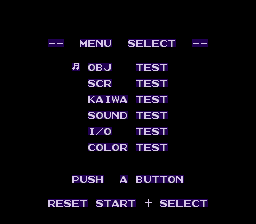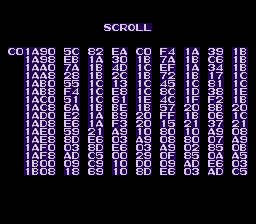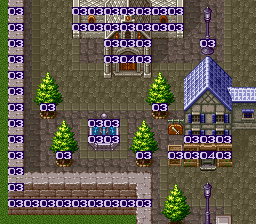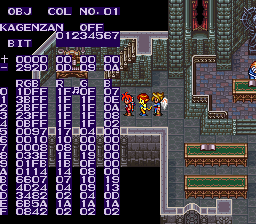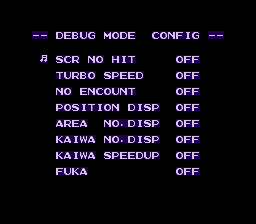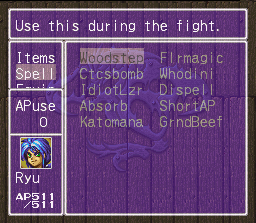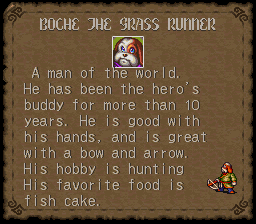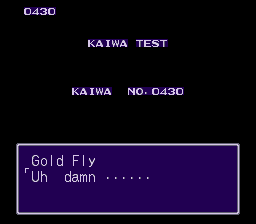Breath of Fire II
| Breath of Fire II |
|---|
|
Also known as: Breath of Fire II: Shimei no Ko (JP)
|
| To do: Prototype "featuring a few uncensored portions of dialogue in the game." Source |
Breath of Fire II is the second game in the Breath of Fire series, as the name suggests. Features an excellent plot for its day, and also a translation legendary for its sheer awfulness. And hilarity.
Contents
Sub-Pages
| Prerelease Info |
| Notes |
Debug Functions
Two very full-featured debug modes exist! One is a menu and the other is activated in-game.
Debug Menu
Use the Game Genie code E7FB-870F DDFB-876F 36FB-87AF to enable the debug menu. To access it, just reset the game. Up and Down selects an option, and A chooses it. Despite what it says, though, pressing Start + Select will not reset the game.
In all menus, Pressing L + R will bring you back to the main menu.
OBJ TEST - You can view every sprite in the game with this, even more than one at the same time. Nice!
- Selectable Options
- ID NO: Selects a character or enemy sprite.
- SEQ NO: Selects a particular action frame.
- PAT NO: Selects a frame of animation from the SEQ NO option.
- COUNTER: Related to animations, purpose currently unknown.
- BG NO: Select a map to use as a background. Default is a black screen.
- MOVE: Automatically animates the shown sprite. Toggle on/off.
- Unselectable Options
- POS X: The X position of the sprite on-screen.
- POS Y: The Y position of the sprite on-screen.
- SEQ ADD: Address where the frame of animation is stored.
- PAT ADD: Similar to above.
Controls:
- Up/Down: Selects an option.
- Left/Right: Increases/Decreases numbers.
- Y/B/X/A - Calls up a particular sprite. You can have up to 4! Select each sprite with the corresponding button to edit it. The first sprite that shows up is highlighted with the A button.
- L - Hold and use the D-Pad to move around the selected map.
- R - Hold and use the D-Pad to move the selected sprite.
- Select - Flips the sprite horizontally.
SCR TEST - A map test! You can move around any map in the game. There is also debug information in the form of a map ID and X/Y coordinates.
Controls:
- D-Pad: Moves the cursor around the map.
- Y: Collision Test(?), shows where your character can or cannot walk in the form of various numbers. A lack of numbers means you can move there in-game.
- X: Removes the cursor, debug information, and some floors. Cannot be brought back without switching maps.
- A: Switches map. ID Number increases by one.
- B: Switches map. ID Number decreases by one.
- R: Hold to move around the map faster.
KAIWA TEST - A dialogue box test! You can view every bit of dialogue in the game, obviously.
Controls:
- Left/Right: Increase/Decrease ID number's ones digit.
- Up/Down: Increase/Decrease ID number's tens digit.
- L/R: Increase/Decrease ID number's hundreds digit.
- A: Activate text box.
SOUND TEST - Just what it says. Tests the music and sound effects in the game.
- BGM: Music player. Digits are from 11 - 5F, however, anything above 42 will freeze the game.
- S.E.: Sound Effects player. Digits are from 01 - 60.
- STEREO/MONAURAL: Switch between Stereo and Mono sound.
Controls:
- Up/Down: Select option.
- Left/Right: Increase/Decrease ID number by one.
- A: Play music or sound effect.
- B: Stop music or sound effect.
I/O TEST - Controller test! Press a button and it will show up as "ON" if it is pressed (or working).
COLOR TEST - Shows the color bar palette. The only thing you can do here is press L + R to exit. However, it's useful for adjusting your screen's colors.
In-Game Debug Mode
Game Genie codes 64FB-8D04 3CFB-8D64 activates the in-game debugging features. During the game, the second controller can be used to access various debugging functions and interact with their corresponding menus. Player 1's controls will work as normal unless a menu appears, in which case Controller 1 will not work. Pressing Start will exit you out of a menu in every instance. Once you leave a menu, you can't access any of the menus again until you leave the current room or access the standard camp menu by pressing X on Controller 1. Press a button to activate the following:
A: CHR Viewer. There are three different ones to choose from, which comes up in a menu:
- OBJ Test: Shows graphics related to sprites. However, the graphics block is off toward the left, making viewing some of these graphics impossible. It also scrambles the background graphics. If you enter another room with this still on, it will scramble the graphics until you reset the game.
- SCR12 Test: Shows the graphics of the background and map pieces. Like the sprite viewer, this is also off to the left.
- SCR3 Test: Show graphics related to text. This viewer is in the right spot.
Controls:
- Up/Down: Scrolls the graphics up and down.
- Left/Right: Toggles palettes.
- Y: Flip sprite tiles horizontally.
- X: Flip sprite tiles vertically.
B: Memory viewer AND editor! Wowza! Be careful, as you can easily freeze the game or worse if you don't know what you're doing.
- RAM 7E 7F - Can view and modify anything from 7E0000 to 7FFFFF. Unlike the other options, this has a sub-menu that will automatically take you to different addresses;
- PASS: Starts at 7E0000.
- PL1-W: Starts at 7E1000.
- EF-W: Starts at 7E18E0.
- HITO-W: Starts at 7E1400.
- XW-WO: Starts at 7E0E70.
- COLOR-W: Starts at 7E1D00.
- GAME-W: Starts at 7E0C80.
- SYSTEM-W: Starts at 7E0090.
- TCBOO: Starts at 7E0040.
- TASK-STACKO: Starts at 7E1E80.
- KAIWA-W: Starts at 7E1C80.
- BK-W: Starts at 7E5000.
- SRAM 30 - Can view and modify anything from 306000 to 307FFF.
- ROM CO-DF - Can view addresses from C00000 to DFFFFF.
Memory Viewer Controls:
- SCROLL MODE:
- Up/Down: Move up and down the memory viewer line by line. Note that this goes in reverse, so pressing Up will take you down to the next set, and vice versa.
- A: Hold and press Up or Down to quickly scroll line by line.
- B: Hold and press Up or Down to scroll by the hundreds digit (i.e. 7E0000 to 7E0100).
- Y: Hold and press Up or Down to scroll by the thousands digit (i.e. 7E0000 to 7E1000).
- L/R: Modifies the first two digits of the address, if possible, up or down one digit, respectively (i.e. C0 to C1).
- Select: Switches to "Modify" mode. Does not work with the third option.
- MODIFY MODE:
- D-Pad: Choose a set of digits to modify.
- A/B: Increase/Decrease the ones digit of the set up or down, respectively.
- X/Y: Increase/Decrease the tens digit of the set up or down, respectively.
- Select: Turns it back to Scroll Mode.
Y: Enables a method of toggling graphic layers and viewing the collision detection. However, when you move around, the numbers will follow you, rendering it useless unless you stand in one spot. Press different buttons to play with the following:
- Y: Toggles showing the collision of the area.
- B: Shows sprite layer only.
- A: Removes Graphics Layer #1.
- X: Removes Graphics Layer #2.
X: Color Mode. This allows for the color editing of many things on the screen. Any changes you make will be reset once you switch rooms.
- KAGENZAN: Controls the color overlay on-screen. Works together with the option below. Can be turned ON and OFF.
- BIT: Chooses various layers and things on the screen to be tweaked with color on the screen. Press Left or Right to change a bit, and the A button to activate it.
- +: Combined with the previous two options, this adjusts the RGB color of the screen. The first adjusts red, the second green, and the third blue. Can be adjusted from 00 to 1F.
- -: This does not seem to work.
- RGB: Alters the individual palettes of any object or sprite. Must press Select in order to access.
Controls
- D-Pad: Move around to select an option.
- Y: Scoots the menu to the other side of the screen for better viewing of things on the right.
- X: Hides the menu from view so long as the button is held.
- A: Selects an option. Also increases the digit of a variable option by 1.
- L: Changes from editing the scenery colors to editing the sprite colors.
- R: Switches.
- Select: Switch between screen coloring and palette editing.
L: "Dokodemo Warp"! It's like the Dr.Warp item in Breath of Fire except in a convenient menu form.
- Left/Right: Increase/Decrease the ones digit by 1.
- Up/Down: Increase/Decrease the tens digit by 1.
- L/R: Increase/Decrease the hundreds digit by 1.
- A: Warp to selected map.
R: Debug Mode Option Menu!
- SCR NO HIT: Walk through walls.
- TURBO SPEED: Go faster, with some animation errors.
- NO ENCOUNT: No random battles.
- POSITION DISP: Can be turned on, but doesn't appear to work.
- AREA NO.DISP: Same as above.
- KAIWA NO.DISP: When you talk to someone, a display with the ID number of the text box will be displayed.
- KAIWA SPEEDUP: Speeds through the dialogue in a text box quickly, including skipping to the next piece of text as necessary. Decisions can still be freely made though.
- FUKA: Appears to be a CPU usage meter, displayed in the upper-right with some glitched graphics.
Select: Activates the unused Dragon Quest test jingle and saves the game on the spot you're standing.
Start: Does nothing, but nullifies your ability to call upon a menu until the next screen switch.
Unused Graphics

The Manillo shopkeepers were apparently intended to use the same little "blowing you a kiss" animation as in the first game, but it was left out for whatever reason.
![]()
A large pot that never actually appears in the game. Unlike similar graphics, this is stored as a sprite, not a background tile.
![]()
It's... a barrel. There were places this could have been used. It just never actually was.
![]()
This fist graphic isn't actually unused, but its palette is. At the very beginning of the game, answer 'No' to Father Ganer's request, and he'll hit you with it. However, as the intro is in monochrome, and this graphic never appears anywhere else in the game, its actual colors are never seen.
| Used | Unused |
|---|---|
Baskets of fruit can be found as decorative tiles here and there in houses around the game world, but sprites of just the fruit can also be found in the ROM, with slight differences in appearance and palette. In Breath of Fire, it was possible to eat baskets of fruit for small HP restoration, and it seems the same was planned for the sequel, but dropped for whatever reason.
Unused Areas
Katt Coliseum Corridor
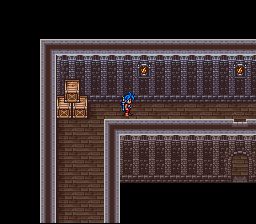
There is no reason in the story to enter the Coliseum's arena through Katt's entrance, and you never do; the area is actually used in Katt's intro/bio sequence. However, the area has full entrance data and collision.
HomeTown Left Apartment Floor 2F

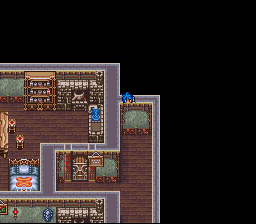
In HomeTown, there are two apartment buildings. The right one houses Ryu and Bow's apartment and has two floors. The left only has a single floor. However, a second floor still exists in the game's coding. Use the Pro Action Replay (PAR) code 7E503094 to access it. There are no NPCs here, but there is a searchable cabinet that has nothing, and a staircase back down to the first floor which places you in a wall where the stairs would have been.
Old Gate Church

It seems that there is an older version of the church Ryu grew up in that resembles all the other generic churches in the game. Use Pro Action Replay (PAR) code 7E503075 to visit it. If you visit it in a new game, the priest will say a line used by someone else in the town, and if you visit it after the opening, he will act identical to the priest used in the final version of the map.
Unused Skills
There are a few skills hidden away in the game's code, with varying levels of effectiveness. All of the unused skills cost 0 AP, and have the generic description "Use this during the fight."
- ShortAP: Probably not intended as an actual skill, but rather the effect of being too low on AP to use one, as it always displays the standard "TooWeak" message when used.
- Katomana: Appears to be unfinished. Selecting it lets you choose a single ally, then proceeds to do 0 damage. Its name is the same as the Japanese name for the "Wall" spell in the first game.
- GrndBeef: Similar to Chopchop and Dice in that it deals unblockable physical damage, except this one is full-strength and hits all enemies. It works perfectly if hacked into a character's skill list, despite the fact that the animation is aimed at your party. It's listed with WildCat's other attacks, so it was likely intended to be used by him.
Unused Skill Names
These skills differ from the ones above in that they are actually used, but their names aren't. Instead of the name being displayed, usually a line of dialogue by the user is shown.
- Woodstep - The "Tree Attack" effect that happens sometimes if you use Spar's "Ntre" command in a forest.
- Flrmagic - The "Flower Blooming" effect that happens sometimes if you use Spar's "Ntre" command in a field.
- Ctcsbomb - The "Exploding Cactus" effect that happens sometimes if you use Spar's "Ntre" command in a desert.
- Whodini - The "Green Energy" effect that happens sometimes if you use Spar's "Ntre" command in a field or other area.
- IdiotLzr - The skill used by Aruhamel to seal your spells. "There, forget your magic!"
- Dispell - The buff-dispelling effect used by Deathevn when he screams "Disappear!"
- Absorb - The HP-draining attack used by Deathevn when he shouts "Be God's Power!"
Unused Monsters
There are four unused monsters hidden in the game's code: C.Kameo, Headhutr, KARI, and Chairman. C.Kameo and Headhutr can technically be encountered inside the Grand Church, but only in rooms where random battles do not happen without cheat codes.
Altering $C55AF2 (HiROM) or x055AF2 (PC address) to 03 FC will cause enemies to spawn in the Grand Church entrance with the locked gate and pressure plate on the floor, complete with the proper battle background. You'll be able to properly encounter C.Kameo and Headhutr with these values.
KARI and Chairman do not appear in any enemy group whatsoever. Both are likely placeholders: KARI translates to "temporary", and Chairman shares the same stats as KARI, meaning that this was likely a placeholder enemy as well. Forcing the game to load either of them will cause incorrect graphics to be loaded.
| Name | HP | MP | EXP | Zenny | Attack | Defense | Agility |
|---|---|---|---|---|---|---|---|
| C.Kameo | 219 | 30 | 776 | 205 | 246 | 164 | 70 |
| Chairman | 1000 | 0 | 200 | 9 | 20 | 1 | 200 |
| Headhutr | 251 | 16 | 922 | 295 | 214 | 122 | 101 |
| KARI | 1000 | 0 | 200 | 9 | 20 | 1 | 200 |
Unused Music
An unused variation of the iconic Dragon Warrior/Dragon Quest inn jingle can be found mixed in with the sound effects. Particularly odd, as neither Enix nor Dragon series composer Koichi Sugiyama had any known involvement in the production of Breath of Fire II. Possibly used to test the sound engine.
Oddities
Hidden Message
| To do: Find the Japanese version of this message to see what it is unmanagled. |
A strange message can be seen if you return to TownShip and speak with Bow after attempting to have Ryu fuse with Sana, but before you talk to the person in Capitan who would send you back there automatically (note said NPC in Capitan is provided because it is normally impossible to return to TownShip otherwise):
October 10th, 5:00 o'clock version!
It's normally impossible to see this bit of text (due to the fact that you cannot pass Windia without Sten or Jean and your respawn point gets forced to Capitan), but it can be done via hacking. The same text can be viewed from otherwise inaccessible coliseum NPCs and Rand using SCR NO HIT at Coursair. It is default text data of sorts, pulled because the game wasn't specifically told what to display here. Presumably, this refers to the game's current build status, albeit mangled, like most of the rest of this game's text.
Windia Bridge
Just east of the mountain Windia Castle sits on is a small, unfinished bridge, which can't normally be seen. A similar bridge was, however, used in Winlan on the original game (it's the same town; the name was merely translated differently), where it's accessible normally and leads to the lands east of the town. It seems there were plans to re-use this concept, but entering Windia from the eastern bridge on the overworld simply takes you directly to an underground catacomb map.
Bleu's Stats
Bleu is unique in many ways. For example, she uses Nina's equipment options instead of having a set of her own. Furthermore, unlike other characters, her stats increase rapidly even after reaching level 50. Actually, each character's stat growth values are stored in huge tables, but only eight of these tables exist. Bleu, being the ninth character, receives stat growth values from the enemy formation data that immediately follows, at 0x57df0. As a result, her stat gains far outpace any other character. Perhaps Bleu was a late addition to the game, which would explain why her implementation seems so clumsy.
Shaman System
The Shaman system is one the more unique features in this game. All Shamans give some sort of boost except for 'Seny' who appears as if she gives nothing. Inside the code shows that Seny is actually supposed to give a boost in the 'Luck' stat. It turns out that there is code to read the luck stat AFTER the fusing but the code that actually boosts the stat does not exist. What's more interesting is that the Shaman system has an unused feature that allows you to DECREASE stats at your choosing! It appears this function is completely unused but it works fully in-game.
Unused Text
Found at 0x18125:
SAN!BOF2SANCHAN BKUP OK
Most of this text is unused but the 'SAN!BOF2' is used as a header in the saved game data.
A kind of error message can be found at 0x18C05:
Won<tRunCriticalFailure
Won<tRunCriticalFailur
There seems to be a bunch of unused spell descriptions for Ryu and his dragon forms! Although, the only real difference is the targeting.
The elements would be 'ice, fire, electric' and the target is 'All, Single, Sngl (Used in electric)'.
A breath of (element). (target)
What's more interesting is that there's one even for G.Drgn!
A breath of supremacy.
Regional Differences
| This page or section needs more images. There's a whole lotta words here, but not enough pictures. Please fix this. |
Character Names
As with the first Breath of Fire game. Breath of Fire II contains many name changes between the Japanese and English versions. The playable characters are listed below even if their name didn't change.
| Japanese | Literal Translation | English Release |
|---|---|---|
| リュウ | Ryu | Ryu |
| ボッシュ | Bosch | Bow |
| ランド | Rand | Rand |
| リンプー | Lin Pu | Katt |
| ニーナ | Nina | Nina |
| ディース | Deece | Bleu |
| ステン | Sten | Sten |
| エカル・ホッパ・ド・ペ・タペタ | Ekaru Hoppa de pe Tapeta | Ekaru Hoppe de pe Jean |
| アスパー | Aspar | Spar |
Text Scroll
There's a short scene with a text scroll near the beginning of the game. The text is in English in both the Japanese and English versions with the Japanese version having Japanese subtitles at the bottom. One of these texts was corrected for the English version.
| Japanese | English |
|---|---|
| A WORD OF DARKNESS. | A WORLD OF DARKNESS. |
Bio Screens
In the Japanese version, there are character bios after each character's introductory scene and before their battle demo. All the data does exist in the English version except for the code that fades the screen and initiates the next pieces. All the main display text is translated. It was most likely left out due to it overwriting all other information on the screen without properly clearing it causing some odd issues as the text wrote.
Title Screen
The English version removes the copyright info on the title screen because it includes it on a separate screen shown on boot.
Wii/Wii U Differences
| This page or section needs more images. There's a whole lotta words here, but not enough pictures. Please fix this. |
| To do: There are multiple flashing effects through the game, such as the bolt spells. There's a good chance they reduced some of the effects to prevent seizures. |
In the Wii/Wii U Virtual Console version of the game, the Gold Fly's line is changed from "damn" to "darn".
| Original Release | Virtual Console |
|---|---|
The Wii and Wii U Virtual Console versions also have motion blur on all sprites and environments barring the player's party during field movement.
| To do: Get images. |
In the token game (available when the player chooses the "wood" carpenter), one line was removed from the instruction text:
「It's kind of like
[ToggleHighlight]Othello[ToggleHighlight].
The remaining text in the message seems to have been overwritten by changing the ROM such as in a hex editor, so a bit of the original message follows as garbage data. It was possibly removed as a trademark issue.
After dumping the script from the VC ROM and comparing to the SNES original, these two changes seem to be the only two.
The Breath of Fire series
| |
|---|---|
| SNES | Breath of Fire • Breath of Fire II |
| PlayStation | Breath of Fire III • Breath of Fire IV |
- Pages missing developer references
- Games developed by Capcom
- Pages missing publisher references
- Games published by Capcom
- SNES games
- Pages missing date references
- Games released in 1994
- Games released in December
- Games released on December 2
- Games with unused areas
- Games with hidden development-related text
- Games with unused graphics
- Games with unused abilities
- Games with unused music
- Games with unused text
- Games with debugging functions
- Games with hidden sound tests
- Games with hidden level selects
- Games with regional differences
- Games with revisional differences
- Pages with a Data Crystal link
- To do
- Needs more images
- Breath of Fire series
Cleanup > Needs more images
Cleanup > Pages missing date references
Cleanup > Pages missing developer references
Cleanup > Pages missing publisher references
Cleanup > To do
Games > Games by content > Games with debugging functions
Games > Games by content > Games with hidden development-related text
Games > Games by content > Games with hidden level selects
Games > Games by content > Games with hidden sound tests
Games > Games by content > Games with regional differences
Games > Games by content > Games with revisional differences
Games > Games by content > Games with unused abilities
Games > Games by content > Games with unused areas
Games > Games by content > Games with unused graphics
Games > Games by content > Games with unused music
Games > Games by content > Games with unused text
Games > Games by content > Pages with a Data Crystal link
Games > Games by developer > Games developed by Capcom
Games > Games by platform > SNES games
Games > Games by publisher > Games published by Capcom
Games > Games by release date > Games released in 1994
Games > Games by release date > Games released in December
Games > Games by release date > Games released in December > Games released on December 2
Games > Games by series > Breath of Fire series

